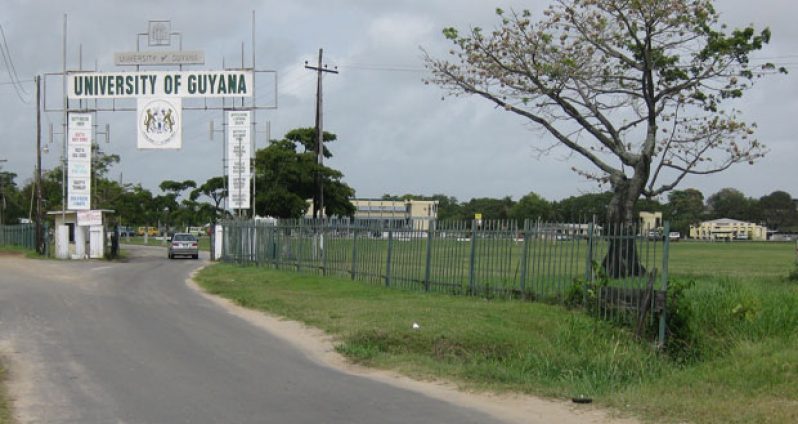ISSUES facing the University of Guyana cannot be resolved by Government alone, but through the combined efforts of all in our society; including Government, the Opposition, non-governmental organisations (NGOs), the private sector, and past and present students of the institution.Vice-Chancellor of the University of the West Indies (UWI), Professor E. Nigel Harris, expressed this opinion and said that crises facing the local institution were not started recently.
He said all stakeholders in society need to work towards lifting the institution to a place where it can be competitive in the twenty-first century.
Professor Harris shared this view while delivering the feature address at the Rotary Club of Georgetown’s World Understanding Dinner, held in the Savannah Suite of the Guyana Pegasus on Friday evening.
Addressing the gathering, which included Prime Minister Samuel Hinds; representatives of the opposition alliance; Dean of the Diplomatic Corps, Russian Ambassador to Guyana, His Excellency Mr Nikolay Smirnov; and more than 200 Rotarians from Guyana, Canada, Grenada, Haiti, India, Netherlands, Philippines, Russia, St Vincent and the Grenadines, Suriname and Barbados on the theme “Transforming Mid-21st Century Caribbean Societies through Tertiary Education”, Professor Harris said that tertiary education cannot exist in isolation in any society.
He said that tertiary institutions have the critical mass of intellect more than any other part of society, and therefore should be the agent of change.
Professor Harris said modern universities are at the heart of development, and these should attract talented academic staff and financing for research with-up-to date facilities that are globally competitive.
Professor Harris said the Caribbean Community (CARICOM) has fallen short on the ratio of University graduates to persons in the labour force; and further, too many persons in the labour force lack the basic entry requirements for university education. He said that development of the intellectual capital will lead to new knowledge for development.
Pointing to the education system created by the United States of America and other developed countries, he said it created opportunities for growth of the human resources and the economy.
He said an intellectually developed work force would result in new and innovative police framing, which would enhance development of the society.
Highlighting the impact of local tertiary education on the Caribbean region over the last 66 years since founding of the UWI, he said that if the UWI graduates in the region were to stop work for one day, Prime Ministers’ Offices in at least 7 Caribbean countries would be shut, and government departments, the judiciary, medical facilities and even churches would be closed.
Professor Harris said that establishment of local tertiary institutions has not only led to development of human resources, but has allowed for self-discovery, as, through research, people in the region can view themselves through their own eyes.
“It has liberated us, as we no longer rely on what others say about us,” he said.
The Professor said the more there are university graduates in a society, the more advanced that society is likely to become. As examples of development in the intellectual capacity of a country, Professor Harris pointed to Uganda, which he stated had one university with an enrolment of 10,000 in 1987, and now has five public universities and 24 private international universities, with an enrollment of over 300,000 students; and to Jamaica in the Caribbean, which had one campus of UWI thirty years ago, but now has institutions offering over 40 international degrees
He acknowledged that there are students in the region — and in Guyana in particular — who continue to do well at the Caribbean Examination Council Exams; but he pointed to the challenges of poverty, disfunctional households, and untrained and underperforming teachers that must be overcome to move the region forward.
He said that re-examination of the tertiary education system must be done with the input of the private sector, so that the training could be tailored to fit the requirement of the private sector in the twenty-first century.
He said that what is needed is a strategic plan that would train person with a common set of skills, not to perform one particular job, but for a lifetime of jobs to suit the rapid changes in technology.
Pointing to the importance of technical vocational training in a modern society, Professor Harris said this must be brought in line with new and evolving technologies. Further, the tertiary institutions should tailor programmes to provide a second chance to adults who would not have acquired the requisite entry level qualifications, but have the aptitude and desire to pursue studies; and where facilities are lacking, the delivery of distance training using modern technology available should be explored.
Professor Harris said that in developing the tertiary education system, attention has to be paid to the education being offered at the primary and secondary levels, and the private sector must play a vital role, as its members are the chief benefactors of the education system.
Professor E Nigel Harris is the Vice Chancellor of the University of the West Indies. He is a Guyanese by birth, a medical doctor and internationally known Rheumatologist who graduated from Howard and Yale Universities and the University of Pennsylvania in the USA. He has received many honours and awards, including the Centennial Award from the National Medical Association of America in 1995 for his contributions to Medicine.




.png)









